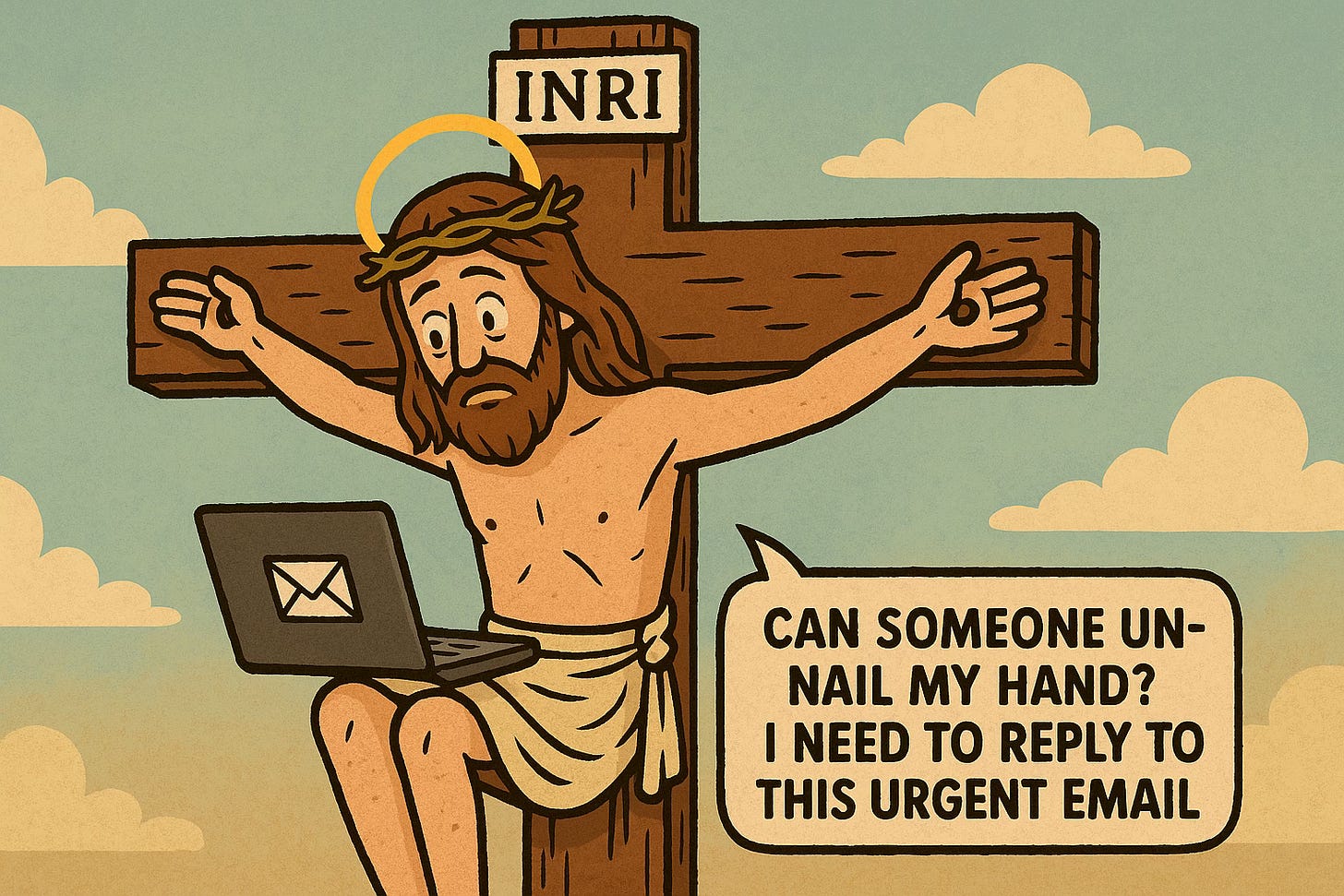The Danger of a Single Identity
And has work become the new religion? And are we burning out in the name of it?
Lately I’ve been thinking about how identity ties into burnout. Here are a few thoughts I’d love your take on.
1. Identity is the sum of the communities we belong to
One part of my talks that always seems to resonate is when I share how I struggled after the British Lions loss.
And it hit hard because I’d wrapped my whole identity around being “Ben the footballer.”
When we won, I felt on top of the world.
But when we lost, I felt like shit.
After that game, it was the worst I’d ever felt about myself and that feeling stuck with me for a long time, and I never enjoyed rugby again.
But now, all my eggs aren’t in one identity basket as I’ve come to see myself as Ben the dad, the husband, the business owner, the public speaker, the parkrunner, the charity organiser, AND Ben the footballer.
And spreading my sense of self across different roles has made me more resilient.
But why does identity matter so much? And what is it about it that shapes our wellbeing?
A few years after I retired, I got super depressed even though I was eating well, sleeping well, and still exercising.
But what I didn’t realise at the time was that I was lonely.
I was working from home on my startup, no longer surrounded by teammates everyday.
I’d see my uni mates at parkrun on the weekend, but during the week, it was just me and the laptop.
That isolation (plus the lockdowns) taught me how vital in-real-life social connection is for good health.
After the Lions loss, I felt like I’d let the whole rugby community down. My identity was so tied to that one group, it felt like I’d failed the only place I truly belonged and why I struggled to get over that loss.
But I feel lucky to have learned how dangerous it is to let your work (or any one role) define you at a young age.
Because when things go wrong, you can feel cast out, even if no one’s actually rejected you.
And without those connections, you miss out on the energy and neurochemicals that come from being part of something bigger than yourself.
All of that has made me believe that identity is really just a reflection of the communities we belong to.
Groups of people that make us feel seen, supported, and safe. And that settles our nervous system.
Being a husband means my community is my relationship with my wife.
As a dad, it’s my family.
If you eat only plants, you’re part of the vegan community, and the more diverse your communities, the more resilient your identity becomes.
Because if one part of your life takes a hit, you’ve still got others to lean on.
Not sure if this is making sense, but in short, to thrive, we need to be part of multiple healthy communities.
I’ll talk about an unhealthy one now because when our identity gets hijacked by toxic work ones, burnout often isn’t far behind.
2. Burnout happens when work becomes you’re religion
As belief in traditional religion declines, many people have turned to work for a sense of community and purpose.
And that’s not necessarily a bad thing, because providing for your family, building something meaningful, serving others etc. are great.
But things go wrong when work becomes everything and we start sacrificing our health in the name of it.
Like a cult.
A cult where the ultimate reward is money so we can buy a quarter-acre block, or more shit we don’t need.
Burnout becomes the price of admission, with rituals like back-to-back-to-back Zooms and working weekends.
"Look at me! I’m sending emails at 11pm on the weekend! I’m hustling like a good disciple."
Some even wear it like a badge of honour. Martyrs sacrificing themselves for the company mission.
And the gods of this religion?
Elon Musk who talks about working 100-hour weeks (divorced three times) and Steve Jobs who pushed himself to the brink… but died at 60 trying to run two companies.
Both are worshipped in the work-religion mindset, and heroes of mine.
But I’ve come to question whether that’s the model we should all follow.
To be clear, I’m not against hard work.
I’m against self-destruction to achieve it
Because when I run myself into the ground, not only does my family suffer, I do WORSE work.
We need people working hard to improve all aspects of life (schools, the health systems, the environment etc).
But we can’t do that if we’re all burned out and miserable.
Sadly, a lot of society has drunk this Kool-Aid.
And if you’re working in an environment that praises commitment over performance, you’re likely in this cult too.
But there’s hope as younger generations are starting to push back.
They’re questioning hustle culture, choosing balance and prioritising meaning over money. And that’s awesome!
Because unlike older religions, which at least tried to make us better humans, this one just burns people out in the name of productivity.
And maybe it’s time that religion died.
Because sacrificing our health for work is not noble or heroic. It’s dumb.
Anyways, bit of a rant and half-baked thoughts.
But I’m curious… do you agree with my take on identity? And has work become a religion for you or the people around you?





I agree! 🙋🏽♂️ I learned this one the hard way, grateful for the lesson, though.
Better to spend 20 hours working at 80% than 80 hours working at 20%.
I gotta block out time for work (usually mornings) and other time for whatever else, then stick as best as I can to those boundaries irrelevant of where I’m up to on the task.
I wonder if the breadth of your identities are a multiplier, rather than a sum?
Anyway, can’t wait for the Lions, and always grateful for the perspective that guys like you and Ollie Hoskins share about your careers and life. How good that he’s getting the send off he deserves back with the Force!